Manchester Pride and sport: 'Never take our mind off why we're having these conversations'
- Published
Why LGBTQ+ representation matters
More than 150,000 people are expected on the streets of Manchester on Saturday for the city's Pride parade.
Before the event, BBC Sport brought a panel of LGBTQ+ sportspeople to Manchester to record a special episode of the BBC's LGBT Sport Podcast.
Rugby player Hannah Davis, British wheelchair basketball star Laurie Williams, Olympic swimmer Daniel Jervis and Scottish football referee Lloyd Wilson speak about Pride, visibility, dealing with abuse and more.
What does Pride mean to you?
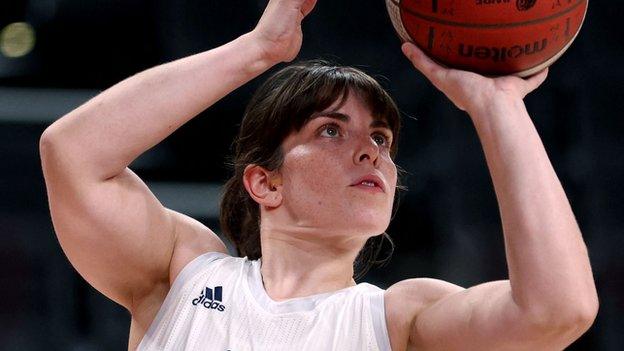
Laurie Williams has been part of the British wheelchair basketball team at three Paralympic Games
Williams: "There's a special buzz, and people come from all over the country to celebrate. It's such a great community to be part of, and Pride shows that with the people who turn up - the things they wear, the way they celebrate."
Jervis: "Yeah, this is my first. I've never done anything with the LGBTQ+ community at all, and I think it's amazing here. It's absolutely beautiful."
Wilson: "I've never been to any Prides before, so I'm really buzzing for the whole weekend. But we'll see how long we last!"
What was your experience of coming out?
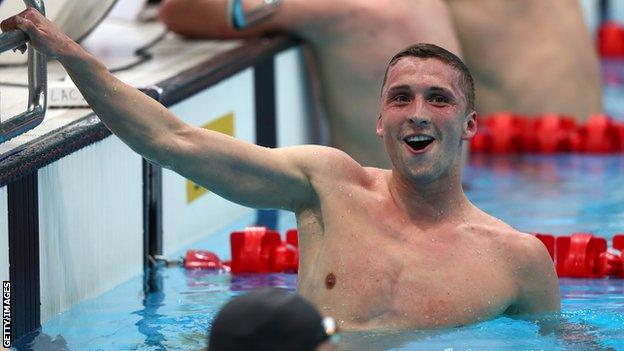
Daniel Jervis won 1500m freestyle swimming medals for Wales at the 2014 and 2018 Commonwealth Games
Jervis: "Everyone is on their own journey. When I was coming out to my family, I wrote a script that I learned. So I said it, and sometimes they'd go quite quiet because they didn't know what to say - so I had a next line ready to say. I have no regrets at all, and I'm really proud I'm part of this community."
Davis: "Rugby and being bisexual is just me, and I've never felt like I've had to introduce myself as that person. I was just expecting to show up one day with a boyfriend, a girlfriend, a partner, and my family would just have to deal with that. And I realised yesterday, talking to my friends, that I never 'officially' came out to the rest of my family. They probably do know - and if they see this, they will!"
Williams: "You forget that it's a thing. Like, why should anyone presume your sexuality? In female team sports, it's not uncommon to have gay or bisexual women. Wheelchair basketball is quite a small community anyway - so if people don't know, it's almost like: 'Where have you been for the past five years?'"
Lloyd Wilson: I hope this does not become a news story in the future
Wilson: "I would say my only regret is waiting so long. The amount of time it's taken me, the amount of courage it's taken me… it almost seemed like too much energy was used on living a way that I didn't want to. Since coming out, I don't know what all the fuss was about really! It's great being in a loving, happy relationship where I don't have to worry about anything. I accept who I am, and if no one else likes it, don't speak to me then. Because I've lived a journey that wasn't enjoyable, and when I look back at it, it is quite emotional."
Have you ever received abuse for being LGBTQ+?
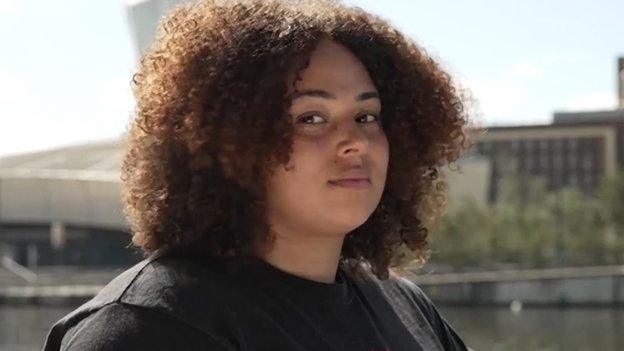
Hannah Davis plays for Premier 15s side Sale Sharks
Davis: "In rugby, we've kind of been branded as 'everyone's gay' or 'everyone's doing this or that in the changing rooms'. We still get it all the time, especially when we go out and stuff. It just seems very unnecessary. For us, it's a bit of a laugh - but I know for some people, it can completely put them off playing women's sport."
Williams: "I've not had it badly, not because of my sexuality. But it can be challenging, being part of disability sport. We do get a lot of positive reinforcement, especially with the Paralympics. People get behind it - but there are always going to be people who don't and just have something to say… and I just don't see the point. You just have to remember that the majority of people enjoy watching it and think it's really impressive.
Davis: "I'm a quick block or report now! I do it with anyone, really. They're bringing a load of other negative comments, and there's so many nice things that people are saying… just report them for saying mean things and get on with it!"
Wilson: "You should try being a referee!"
How do you react when people say 'no-one cares if you're LGBTQ+'?
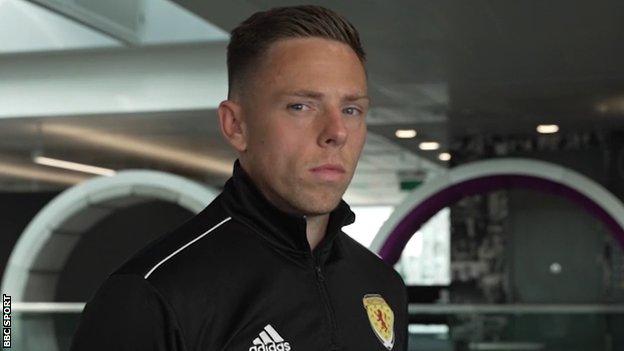
Lloyd Wilson referees in Scottish Leagues One and Two, and has been a fourth official in the Scottish Premiership
Wilson: "I actually love that comment, because I think it generates discussion and conversation. People are taking time to write that, so clearly they care. Everyone cares about it one way or the other, whether they're part of the community or not. Everyone has an opinion on what we do! And it absolutely still matters, because we know that people are still living a life they don't want to live.
Jervis: "Lloyd probably looks at it in a lot better way than I do. When I came out, I had nothing negative directly, only positivity. But because it was in a few newspaper articles, there were some small comments. 'Who does this guy think he is?' 'Who cares?' And then I'd go on to my messages on Instagram - and if you could see some of these messages, you'd realise who cares. Some of these people telling you their stories… they've lost relationships with families. And I've had nothing like that."
How important is representation?
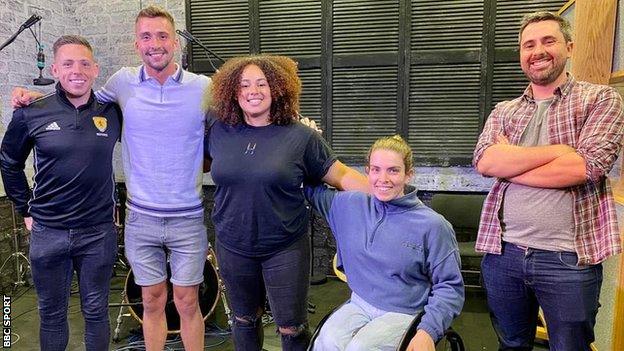
From left: Football referee Lloyd Wilson, Olympic swimmer Daniel Jervis, rugby player Hannah Davis, Paralympic wheelchair basketballer Laurie Williams and LGBT Sport Podcast presenter Jack Murley
Davis: "Before recent times, there weren't a lot of bisexual characters in things, and I never really understood how I could be attracted to both genders. I didn't really understand that. And where I did see it, it was sort of a villain character or a very promiscuous person, and I didn't really understand whether what I was feeling was right, or had a name. In more recent times, there are more characters in shows where you can look and see it is an option to have, and it is a way that people can feel. The more people realising who they are and accepting it… it's important that we can address that for people."
Jervis: "I saw Jake Daniels come out, and a part of me wondered why I hadn't done it already. He's 17, and I was 25 at the time. In a way, I suppose a little part of me was jealous, because he was living his best life from such a young age. I'm not the first openly gay male swimmer. We have people like Michael Gunning, and he is a fantastic ambassador I could talk to - and I want to be that for someone."
Wilson: "We do need to pay a moment to remember those who are still living that life of hell I lived, and that I'm sure all of us in this room have experienced once upon a time. I'm sure there are lots of people out there who are continuing to live in that way, and I think it's crucially important that those who are able to share their story do. We're all sitting here today, having this discussion, because there's something extremely powerful behind what we've done, and I think it's really important not to lose sight of that."
Williams: "That's why conversations like this are so important. For people listening, they'll realise that we've all had our own experiences and there's no right or wrong way to do it. These days, there are a lot of platforms that can help people. Back in the day, there wasn't TikTok or Instagram to see people who were out and comfortable. Nowadays, it seems like people are able to accept themselves at a younger age. There's a phrase 'you can't be what you can't see', and I 100% believe that, so I think things like this are really important."
Why does Pride still matter?
Davis: "They keep saying that the community is getting bigger, or that there's more people within that community. I think it's just more people are ready to feel they can express that to themselves. There's always been that community, but it wasn't really something that people were open about. It's amazing to see more people being open and honest about who they are."
Wilson: "Last night, we were out on Canal Street and there was someone speaking to me who had been working in gay clubs for 20 years. I felt quite emotional for that person - 20 years ago, being openly gay… to think that person had the pride and the courage to do that. That's why we're all here today. That's why there's such a thing as Pride, to celebrate our right to be us. We need to never take our mind off why we're having these conversations."
Daniel Jervis, Hannah Davis, Laurie Williams and Lloyd Wilson were speaking to Jack Murley on a special Manchester Pride edition of the BBC's LGBT Sport Podcast. You can hear new episodes every Wednesday on BBC Sounds.

'What I discovered surprised me': The ex-England footballer Paul Merson goes on a reflective walk to confront his demons
What if Leeds United had won the Champions League in 2001? Specs Gonzalez dives into the multiverse to change football history
